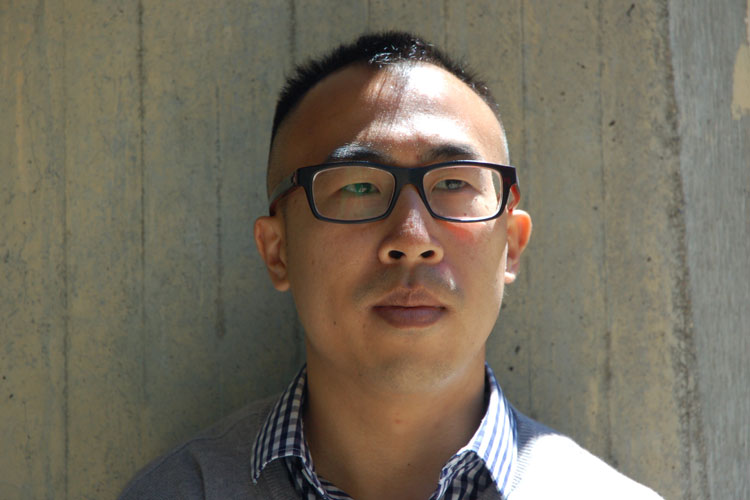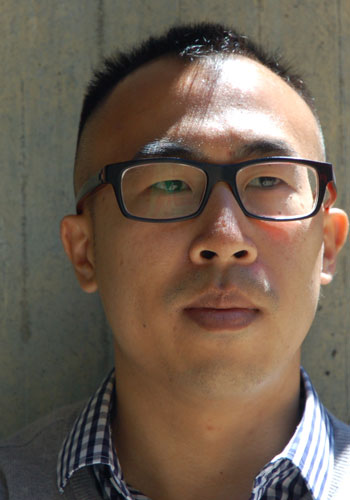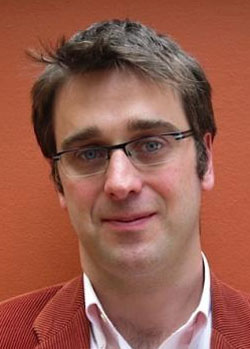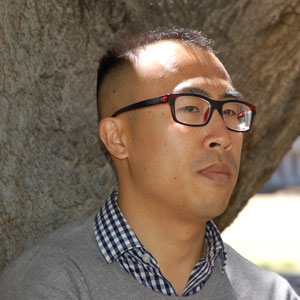Berkeley-bound scholar rises from the depths of schizophrenia
Brandon Chuang takes the mental disease he will be studying very personally

August 18, 2016
Brandon Chuang was an ambitious research assistant investigating schizophrenia treatments in military veterans when he began to suspect friends and colleagues of hacking into his Facebook account. As his paranoia escalated into altercations and psychiatric hospitalization, it emerged that the insidious disease he had been studying in others had taken hold of him.

Brandon Chuang, who has schizophrenia, starts a graduate program in clinical psychology next week (UC Berkeley photo by Yasmin Anwar)
Through sheer grit, the right medication and improv comedy, Chuang has problem-solved his way out of the dark psychosis that struck him in 2012. Gone is his fear that mental illness would doom him to a life of menial jobs and social isolation. He’s starting a Ph.D. program in clinical psychology at UC Berkeley next week.
“Getting into Berkeley is the happiest I’ve been,” says Chuang, 28, a native of Cupertino, California, and a UCLA graduate in molecular biology. “It’s the culmination of all my hard work. It tells me I can accomplish great things, that I can live my dreams.”
Ann Kring, chair of psychology at UC Berkeley, studies schizophrenia, and is thrilled to have Chuang aboard. His application made it to the top of her pile due to his strong letters of recommendation and rigorous research experience. When she saw Chuang’s disclosure of schizophrenia, she was even more excited to work with him.

Ann Kring, chair of psychology, is excited to work with Chuang.
“He will have a great deal to contribute to our research, as a scientist, as an advocate, and as a person who has been touched by schizophrenia,” Kring said.
The support of mentors
Joshua Woolley, a UCSF psychiatrist who supervised Chuang’s schizophrenia research at his lab at the Veteran’s Administration Medical Center in San Francisco, has seen Chuang through the worst of his ordeal and can attest to his laser-sharp focus and resilience.
“I’m really proud of him, and his incredible grit and determination,” says Woolley, who convinced Chuang to get a psychiatric evaluation when others were in denial about his troubling change in behavior. “He’s a role model for a lot of people.”
At least 2.5 million Americans have been diagnosed with schizophrenia, a disorder associated with neurochemical imbalances and disruptions to brain networks that are still developing. It typically strikes between the mid-teens and 20s and can result in severe psychosis if untreated. At worst, its symptoms can lead to homelessness, incarceration and suicide.
“It’s a serious illness,” Woolley says, adding that the stigma doesn’t help. “People find it scary, and so those who have it feel a lot of shame.”
The signs of its onset include social withdrawal, a flat affect, loss of motivation, paranoia and isolation, symptoms that can be easily mistaken for depression, Woolley says.
One common misconception about schizophrenia is that it manifests as a “split personality.” But Chuang knows otherwise:
“It’s not like the mind is split. It’s like it’s shattered,” says Chuang, who knows of no family history of schizophrenia. “It’s like a lot of things are going wrong in the brain.”
Hard on himself
The youngest of three sons born into a Chinese-American family of high achievers in Cupertino, Chuang recalls he was more introverted than his brothers, Kenji and Eric, but also harder on himself. His father, Patrick, a hardware engineer, and his mother, Connie, a retired accountant, encouraged his ambition.
He breezed through academics at school in Cupertino, earning good grades, but found social interactions more challenging. “Connecting with people was one of the toughest things for me,” he says.
Chuang went to UCLA, where he joined a fraternity and graduated in 2010 with a bachelor’s degree in molecular biology. He applied to medical school, but was rejected, so he landed a volunteer gig as a research assistant in Woolley’s lab and moved to San Francisco.

Joshua Woolley, M.D.,
At the VA Medical Center, he researched the therapeutic benefits of oxytocin, a hormone linked to empathy and nurturing, to military veterans with schizophrenia. In addition to analyzing data, he co-authored several studies published in Psychoneuroendocrinology .
He was doing well, but in the summer of 2012, Chuang began to misread social cues and imagined people were hacking his computer. His brother Kenji, an optometrist, shrugged off his conspiracy theories as weird but harmless, Chuang says.
As for his parents, “They didn’t want to admit anything was wrong,” he says. “For them, mental illness is looked down upon because of cultural biases.”
Luckily, Chuang’s demeanor and seemingly unfounded paranoia did not escape the attention of his boss, Woolley.
“I noticed him being withdrawn. He had a flat affect. I thought he was depressed and so I asked him what was going on,” Woolley says. “He said he thought a girl had hacked into his Facebook page, and that others were also involved, including me.”
Chuang took Woolley’s advice to seek medical help and was diagnosed with social anxiety and depression. Antidepressants like Prozac alleviated his paranoia but muddled his mind, so he stopped the medication. The rebound effect hit him hard.
Brain felt ‘like it was on fire’
“My brain was in pain, and I felt like the only way to get out of the pain was to fight,” Chuang says. “So I got into a fight about something with my brother Kenji,” physically attacking him while they were watching television. “My parents called the police, and they came, and I tried to fight with them.”
Chuang was hospitalized under the state’s involuntary psychiatric-hold law for two weeks. A few hours after his discharge, he says, his brain literally felt like it was on fire.
“All I could do was scream and I kept screaming,” he says. “I asked for a pill to commit suicide because I couldn’t stand it.”
He was hospitalized again and diagnosed with schizophrenia. This time, he was put on olanzapine, an antipsychotic medication that resets dopamine and serotonin receptors to stabilize moods and behavior. He began to regain his mental balance.
His parents, who were caring for him, worried that his psychosis would return if he pushed himself too hard and told him to take it easy. But Chuang, who was growing bored, had other plans: “I wanted to work hard and achieve big things,” he says.
He begged Woolley to let him return to work at the lab. At first, Woolley was reluctant, not knowing how Chuang would cope in social situations, around patients and with the stress of the lab. But his desire for Chuang to recover and get back on track won out. He helped Chuang apply for two National Institute of Mental Health diversity research grants to pay Chuang a modest salary.
“He needed a sense of purpose,” Woolley says. “He needed the job.”
Grateful for a second chance, Chuang worked hard at the lab, took his meds faithfully and stepped outside his comfort zone to develop his social skills. He took classes in improv comedy to improve his spontaneity, and joined Toastmasters to develop his public speaking and leadership skills.
Improv helps with spontaneity
“Improv helps with being able to figure out what other people are thinking, which can be hard when you have a mental illness,” Chuang says.
He also applied to graduate psychology programs, and was accepted to UC Berkeley. Woolley was so proud of Chuang that he pitched a story about his odyssey to the UCSF news office. An article ran in June in the science publication STAT.

At Berkeley, Chuang plans to experiment with improv and other therapies to treat symptoms of schizophrenia. As a volunteer with the National Alliance on Mental Illness, which seeks to destigmatize psychiatric disorders, he intends to talk openly to his cohort about his disease and participate in support groups.
“I’m a person. I’m not my illness,” says Chuang, whose medication can give him a flat, even severe demeanor. “If you get to know me, I’m a very kindhearted person.”
He’s given up his ambition to become a medical doctor: “Talking to people is not my forte, but I want to help people, so a Ph.D. program in clinical psychology is the best fit because I can create my own experiments,” he says.
As for how he’ll cope if things don’t go exactly as planned?
“There might be times I fall back, but I’m more confident than I’ve ever been because of what I’ve been through,” he says. “What helped me get though the dark days was to have a purpose, and that’s what I have now, to study schizophrenia and find new treatments, and to keep moving forward.”